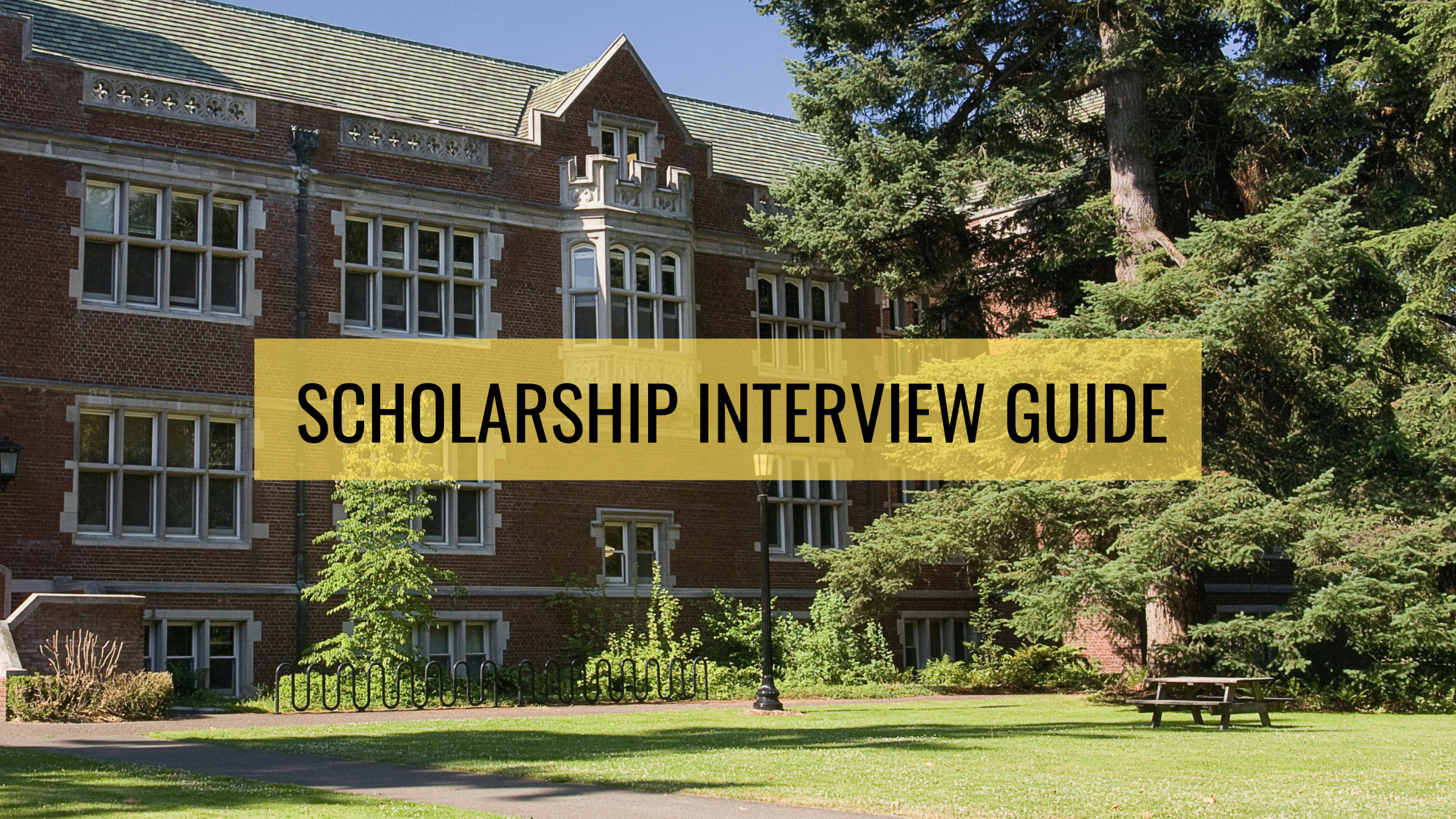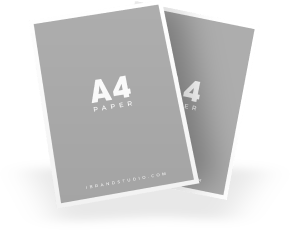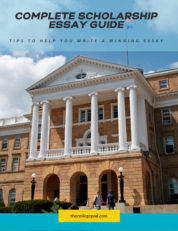You've done your research. You've applied for as many scholarships as you could find that fit your educational plans. Now, you must sit and wait to hear back from the scholarship gatekeepers. Then you receive the good news! You've moved onto the next phase of the scholarship process: the beloved scholarship interview process. But how do you prepare for a scholarship interview, you ask yourself.
This is where this guide comes in handy. We understand the anxiety students suffer from when facing scholarship interviews. We hope this guide will give you lots of practical scholarship interview tips to calm those nerves, shore up some communication skills, and ace the scholarship interview!
Expert Scholarship Interview Tips
Research, Research, Research
First off, even though you may have researched scholarships during the application process, it's always a good idea to dig a little deeper before an interview. Discovering the history of the scholarship allows you to communicate more effectively with the interviewer. They'll know you've done your homework. It's important to remember while conducting this background research that the interviewer already knows this information. You're not researching to tell the interviewer what they already know. You're researching to connect yourself to the club, organization, or school and learn why you're the best candidate to receive their funds.
For example, is this scholarship awarded by a club in your community? Understand what the club's goals are and try to discover a few key things they've helped with in your area. How did you benefit from this club as you attended school? Is this scholarship from the school where you've applied? Discover who else may have received these funds previously and how those students made a difference on or off campus. Are those individuals role models you can emulate should you be awarded the scholarship? This type of research allows you to have talking points and helps you better understand some of the interviewer's questions.
Know Who's Who?
Though not always possible, it's a tremendous bonus if you know who your interviewer is ahead of time. Putting a face with a name can ease your nerves. Also, many scholarship programs (especially those from colleges) have a list of faculty along with photos and small biographies on the schools' sites.
Can You Elaborate on That?
Another of the best scholarship interview tips we've found is this: The interview process is meant to be a conversation, not a verbal checklist or a robotic replay of everything you've learned and hope to become. So try not to respond with only simple "yes" or "no" responses when asked questions. Instead, expand your answers naturally, allowing your personality to show through.
Practice, Practice, Practice
Once you've compiled a list of questions and possible answers, do some role-playing with a parent, fellow student, or your guidance counselor. Practicing face-to-face interview techniques and various question-and-answer scenarios bolsters your confidence and may open up areas you need to work on, as well.
Jot It down
Consider bringing a notebook and pen to your interview. If the interviewer asks a question and you don't know the answer — write it down. It's okay not to know everything. A sample response, in this case, could be, "I'm not sure, but I will definitely look into that." It's best to use paper and pen for this and not your phone — it will help you to stay focused and lets the interviewer know without a doubt you're engaged in the process and not simply checking your text messages. Afterward, look into it in your free time.
>>RELATED POST: Four Types of Financial Aid You Should Know
Getting Ready for the Interview
Getting ready for a scholarship interview may seem intimidating, but it's similar to preparing for an important test in school. Just like studying for exams, taking care of yourself by getting enough sleep and eating well, as well as staying calm, can help you do your best during the interview.
Time and Place
Here are three essential tips to help you excel in your scholarship interview:
- First and foremost, make sure you know the date, time, and location of your scholarship interview. You can't ace it if you miss it.
- Write this information down on paper and add it to your calendar.
- Add some reminders about a week out from the date to get some practice time in.
Choose a Business-Casual Outfit
No jeans or t-shirts allowed. Dress as if you're going to a job interview in your chosen field. Laying your clothes out the night before will save you time the next day and allow you to notice any problems with the clothing (Cat hair? Holes? Need to make a department store run, etc.).
Take Care of You
Sleep, hydration, and protein. Just like the night before and the morning of a big test, getting good rest and eating a proper meal can help with clarity of thought, keeping blood sugars stable, and helping ward off nervous jitters.
Transportation Versus Technology
Depending on if your interview will be virtual or in-person, have a plan in place ahead of time. In person? Make sure you have reliable transportation to and from the interview. Virtual? Know your tech equipment — or know if you need to borrow someone else's.
Be Flexible
If the last couple of years have taught us anything, it's that anything can change. Be prepared should your interview be moved from in-person to virtual or vice versa. Some things won't change if this happens – like dress code and question prep – but time and location definitely will. Be open and honest with the scholarship committee if a last-minute flip between in-person to virtual won't be possible because of technical issues.
In addition, let them know if illness or emergency prevents you from being present in person.
Breathe
Before, during, and after. Then breathe again. It helps calm the nerves. Also, during your interview, don't be afraid to pause for a few seconds before answering — this gives you time to gather thoughts and, well, to breathe.
>>RELATED POST: 6 Scholarship Tips You Should Know
In-Person Scholarship Interview Preparation
In addition to the "Getting Ready" tips above, here are a few specific suggestions for the in-person format.
Know Before You Go
Do you know where to park? Allowing extra time to find parking on campus or in a busy part of town is a wise idea. Also, allow time to navigate larger buildings in search of the interview room. Ideally, you should arrive with enough time to breathe, use the restroom, and re-read your interview questions and notes before your meeting begins.
Safety First
Will the facility require a mask? Depending on each organization's regulations, it may be wise to tuck a mask into your pocket just in case. If your interviewer is wearing one, and masks are not required, ask the interviewer if they'd prefer you wear yours. If there's hand sanitizer available, use it.
Do You Have Your ...
Make a checklist of things to bring. Items such as a resume, your questions, directions, a photo ID, a mask and any documents that the interviewer may have requested will make you appear prepared. You could also be asked to provide proof of COVID vaccination.
Silence, Please
Be sure to turn off your phone or put it on silent mode. Be present in the room and focused on the interviewer. It's the courteous and professional thing to do.
Heads Up!
Make eye contact and speak clearly. If you answer with your mouth aimed at the table, you'll be hard to understand, especially if you're wearing a mask.
Virtual Scholarship Interview Preparation
If an in-person interview isn't possible, you must be prepared to go digital!
Location, Location, Location. Choose a room that is as free of distraction and noise as possible for your interview. It should have good lighting and nearby electrical outlets. Your internet signal should be strong in this location. Clean the area behind you that appears on the camera. Put away clutter and those empty water bottles. On the day of your interview, allow for privacy by locking pets and siblings out of the room. And though they may be tempted to watch you ace your scholarship interview, parents should not be lurking off-camera in the same room. This is your time to shine. It's all about you and your interviewer — not Mom, Dad or Great-Granny Sally.
Equipment Check. Ensure your laptop or device has onboard the appropriate software to conduct the interview. If you're unsure, contact the scholarship committee or the school and ask which apps you need to install. These apps are usually free and easy to download, but you don't want to wait until the last minute to find out you're waiting in the wrong app.
Testing, Testing. Do a dry run with a parent, a fellow student or a willing teacher. Connect through your videoconferencing app, and even rehearse questions and answers while you're at it. If possible, videotape yourself answering the questions. Play it back and see if you are making eye contact by looking directly into the camera. Are you coming across as stiff or personable? Check for audio clarity, lighting issues, background clutter, and set up your seating/desk so that it's comfortable for your height.
Common Scholarship Interview Questions
One tried-and-true method of test prep is to make a list questions. Anticipating what may be asked on an exam is a great way to study. Likewise, brainstorming a list of questions that an interviewer may ask during your scholarship interview is a great way to prep and ease nerves. And remember to do your research into the scholarship's history. That may come in handy with information you need to help you ace your scholarship interview.
Here are some commonly asked questions and some sample answers. It's important, however, if one of these questions does come up, that you don't simply recite a memorized response. Instead, be calm and natural in your reply — remember, you're not a robot.
Question: Why do you want to attend our college? / Why did you apply for this scholarship?
Response: The interviewer already knows about the college or the scholarship. But, if you've done your homework (a.k.a. research), you'll be able to make this personal and relevant to your strengths and/or extracurricular activities.
Question: Tell us about yourself.
Response: This is such a broad question, isn't it? But your answer shouldn't be broad at all. Pick one thing to focus on, highlight some goals and accomplishments linked to that trait, and how your attribute improves your community or those around you, or help you achieve personal goals. Also, be careful not to simply restate all the information on your resume or scholarship application. Look over these documents if you kept copies, so you don't repeat your answers, and then go deeper. Weave in a story. Let the interviewer get to know you better. For example, if you love reading and writing fiction stories, a long-term goal may be to publish a novel, and a short-term goal might be to major in English. You may talk about how fun it is to see other people get enjoyment out of something you've written, and even provide a concrete example.
Question: What is your greatest strength? / What is your greatest weakness?
Response: Of all the questions, those requiring the most personal reflection can be the hardest. Some students find it difficult to "brag" about themselves. And no one likes discussing their weaknesses. For the strength question, be specific and give examples of how your strength helped you or someone else. It's okay to be proud of your accomplishments. For the weakness question, recognize a specific fault that you struggle with and illustrate how it makes you feel and how you're working to better yourself in that area. Tread carefully. Whatever you do, don't offer an example that turns out to be a deal breaker.
Question: How will you use the scholarship funds?
Response: This is another area where research and planning ahead will serve you well. Know how much your education will cost, from tuition to meals, books, housing and incidentals. Make a budget and keep it in your folder. Your interviewer will want to know that the funds will be used in a worthwhile manner. It's okay to let them know you've also applied for other scholarships and that you desire to keep your debt as low as possible.
Question: Why do you deserve this award?
Response: This is another question where you can let your personality and strengths shine — but take care not to list your GPA, sports and clubs robotically. The interviewer already has this information in your application or from previous questions, and many other applicants possess similar academic achievements. Instead, this is an excellent time to showcase your work ethic, how you've overcome frustration or hardships in the past, and how this indicates a good trajectory for future growth.
Question: Do you have any questions for me?
Response: This is your opportunity to dig into your previous research and ask at least one of your questions. Wait for the interviewer to answer, then respond by thanking them or by commenting further to show them that you listened to them and cared about their answer.
Question: Is there anything else you'd like to tell us?
Response: Here's where you can thank the committee for considering your application and show them that you did additional research into their cause or the school's mission. Something like, "I'm so excited for the opportunity to learn from the best English Department in the Big Ten. I can't wait to see how my writing improves with the help of your professors." This type of response stays on topic with previous responses and shows your knowledge of the school's program.
Follow-Up Ideas for After Your Scholarship Interview
Say Thanks. No matter the outcome, be courteous. Write a handwritten note to your interviewer or the scholarship committee thanking them for their time and for considering you as a recipient. Reflect on one or two highlights that you learned and sign your name. Write neatly, proofread it, and send it via snail mail if possible. Alternatively, email works, but most people enjoy getting "real" mail. And real mail is harder to forget.
Keep Track: Make a file either with a folder or on your computer regarding the scholarship interview, the interviewer's contact information, and your research. This file is important if you're applying for multiple scholarships.
Learn From It: While the event is still fresh in your mind, make a few notes about why it went well – and how it could've gone better. This list will serve you well for future scholarship interviews as well as potential job interviews.
Want more tips and tricks for student life? TheCollegePod.com produces a newsletter highlighting all things scholarships and financial aid. Simply subscribe with your email, and you're all set.
And, good luck!



